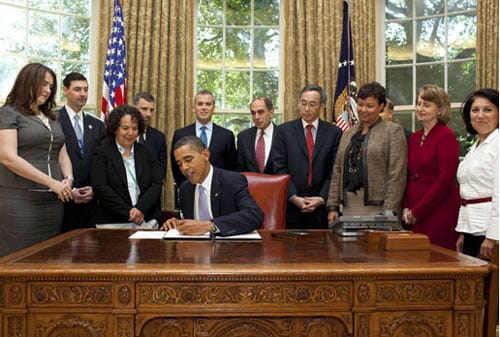Executive Orders: What The Founding Fathers Wanted?


What is an executive order? Depends on who you ask.
Former President Clinton advisor Paul Begala said, "Stroke of the pen. Law of the Land. Kinda cool."
Former Interior Secretary Bruce Babbitt said, "We've switched the rules of the game. We're not trying to do anything legislatively."
Executive orders are regulations issued by the president that do not require Congressional approval, and they become law after 30 days. Presidents have issued executive orders for a long time.
In fact, the first executive order was a communique issued on June 8, 1789, when President George Washington asked department heads “to impress me with a full, precise, and distinct general idea of the affairs of the United States” handled by each official. That communique is reasonable, in that it was limited to department heads within the government. But what about other executive orders?
Probably the most famous executive order came on January 1, 1863, when President Abraham Lincoln issued the Emancipation Proclamation. Issued during the third year of the Civil War, the proclamation declared "that all persons held as slaves" within the rebellious states "are, and henceforward shall be free."
After the December 7th, 1941 attack on Pearl Harbor, President Franklin Roosevelt issued Executive Order 9066, which called for the removal of Japanese-American citizens during the time of World War II into internment camps.
What about recent executive orders? One Executive Order that has people concerned was issued on March 16th, 2012 by President Obama, EO 13603 (called National Defense Resource Preparedness). Cato Institute Senior Fellow Jim Powell says "This 10-page document is a blueprint for a federal takeover of the economy that would dwarf the looming Obamacare takeover of the health insurance business."
Should we have executive orders? Past and current supporters of presidents issuing executive orders claim there is constitutional authority, coming from Article II, section 1 ("The executive power shall be vested in a president of the United States of America.") and Article II, section 3 ("The President shall take care that the laws be faithfully executed."). If you review the Constitution, though, you will see that there is no specific enumeration anywhere which allows for executive orders.
If we are talking about using executive orders to direct executive agencies on implementing Congressional approved legislation, that is reasonable. But if we are talking about using executive orders to create law without Congressional approval, however well-intended, that gives too much power to one person and goes beyond what the founding fathers had intended when they wrote the Constitution.



